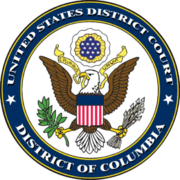Cobell v. Kempthorne
| Cobell v. Salazar | |
|---|---|
 |
|
| Court | United States District Court for the District of Columbia |
| Decided | 2009 |
| Case opinions | |
| Decision by | (settled) |
Cobell v. Salazar (previously Cobell v. Kempthorne and Cobell v. Norton and Cobell v. Babbitt) is a class-action lawsuit brought by Elouise Cobell (Blackfeet) and other Native American representatives in 1996 against two departments of the United States government: the Department of Interior and the Department of the Treasury for mismanagement of Indian trust funds. It was settled in 2009. The plaintiffs claim that the U.S. government has incorrectly accounted for the income from Indian trust assets, which are legally owned by the Department of the Interior, but held in trust for individual Native Americans (the beneficial owners). The case was filed in the United States District Court for the District of Columbia. The original complaint asserted no claims for mismanagement of the trust assets, since such claims could only properly be asserted in the United States Court of Federal Claims.
The case is sometimes reported as the largest class-action lawsuit against the U.S. in history, but this is disputed. Plaintiffs contend that the number of class members is around 500,000, while defendants maintain it is closer to 250,000. The potential liability of the U.S. government in the case is also disputed: plaintiffs have suggested a figure as high as $176 billion, and defendants have suggested a number in the low millions, at most.
The case was settled for $3.4 billion in 2009. $1.4 billion was allocated to be paid to the plaintiffs and $2 billion allocated to repurchase fractionated land interests from those distributed under the Dawes Act and to return it to reservations and communal tribal ownership. In addition, a scholarship fund for Native American and Alaska Native students was created, to be funded from purchase of fractionated lands. It is named the Cobell Educational Scholarship Fund in honor of lead plaintiff Elouise Cobell, who filed suit against the government in 1996 and persisted with the case until settlement. The scholarship fund has a cap of $60 million; $40 million had been contributed to the fund by November 2016.
...
Wikipedia
